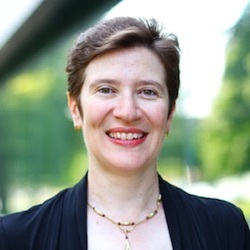WCT sat down with Dr. Nur Zincir-Heywood, computer scientist, to talk all things gender diversity, academia, and taking risks in the workplace.

WCT: Can you share a little bit about what you do? What does a typical day in the lab look like for you?
Dr. Zincir-Heywood: I am a Professor at the Faculty of Computer Science at Dalhousie University. My expertise is in computer networks and cyber security. So, I teach and do research in these areas. In my lab, I have research students at multiple levels of maturity, studying for their undergraduate, Master's or PhD degrees. I also work in different departmental committees such as Search Committee, university-level committees such as Women in Research Committee, and national-level committees such as CNSM 2019 and NOMS 2020. So my typical day involves lots of multi-tasking between all of the above activities. I work independently and in groups, with my students to solve problems (such as how to identify insider threats or identify which tweets represent fake news) and with my colleagues (such as how to create more inclusive and diverse environments in our faculty). I teach, I research, and I invent. What could possibly be better?
WCT: Was computer science something you were always interested in? Is it something you pursued immediately after high school, or is your career path less linear than that?
Dr. Z-H: In my case, computer science was something I was interested in and pursued immediately after high school. Being an academic is something I decided after my co-op terms (internships). However, finding the area that interests me the most was not as straightforward. I had several opportunities that I had pursued from AIESEC to British Council to ISOC, which introduced me to different aspects/facets of computer science. By working in different areas, I was able to find the ones that interested me the most. I like questioning the regular way of doing things, researching to improve the ways of doing something, and teaching what I have explored and studied.
WCT: What challenges did you encounter pursuing a career as a womanin a predominantly-male field? How did you overcome these challenges?
Dr. Z-H: In most of my career, I was either one of the few females or the only one in a class, in a department or in a meeting. Well, that means nobody will ask me to have a beer after work, or go to golf on the weekend ;-). In other words, one does not have established social networks to start with. But this does not mean you cannot create one!
In my opinion, the best way to overcome challenges is to concentrate on opportunities, because every challenge also comes with an opportunity. Sometimes, you need to take the risk and be the first. You need to speak up, and you should not accept to be "not equal." They will follow.
WCT: Do you notice a lack of diversity in your field? How do you think we can encourage more women to pursue STEM careers?
Dr. Z-H: Yes, there is a lack of diversity. Having said this, I think there are more women in certain STEM fields and less in others. Indeed, Computer Science is one of the fields where there is less women. I do not appreciate the approach some people seem to suggest, i.e. "less math will attract more female students." We are all capable and good in math, science, logic, languages, and whatever else we wish to be. There are many different facets of Computer Science from natural language processing to artificial intelligence, to robots to networks, to cyber security and privacy, and more. The more we show the different facets of our discipline, the more we can knock down the stereotypical images linked to computer science. It is much more than living in a garage, eating chips, and writing programs, which Hollywood seems to think!
WCT: If you could tell your younger self one thing, what would it be?
Dr. Z-H: Don't worry, all is good :-)
WCT: What is a quote you live by?
Dr. Z-H: "Do not harm, but take no shit," a quote from Elizabeth Lesser.
Thank you, Nur!





